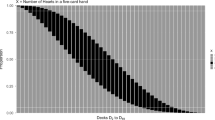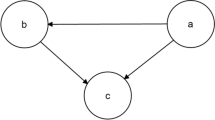Abstract
We consider the problems arising from using sequences of experiments to discover the causal structure among a set of variables, none of whom are known ahead of time to be an “outcome”. In particular, we present various approaches to resolve conflicts in the experimental results arising from sampling variability in the experiments. We provide a sufficient condition that allows for pooling of data from experiments with different joint distributions over the variables. Satisfaction of the condition allows for an independence test with greater sample size that may resolve some of the conflicts in the experimental results. The pooling condition has its own problems, but should—due to its generality—be informative to techniques for meta-analysis.
Similar content being viewed by others
References
Chickering D.M. (2002) Optimal structure identification with greedy search. Journal of Machine Learning Research 3: 507–554
Eberhardt F., Glymour C., Scheines R. (2005) On the number of experiments sufficient and in the worst case necessary to identify all causal relations among N variables. In: Bacchus F., Jaakkola T. (eds). Proceedings of the 21st Conference on Uncertainty and Artificial Intelligence. AUAI Press, Corvallis, Oregon, pp. 178–184
Eberhardt, F., Glymour, C., & Scheines, R. (2006). N−1 experiments suffice to determine the causal relations among N variables. In D. E. Holmes & L. C. Jain (Eds.), Innovations in machine learning (pp. 97–112). Springer.
Fisher R. (1935) The design of experiments. Hafner, New York
Mansinghka, V.K., Kemp, C., Griffiths, T.L., Tenenbaum, J.B. (2006) Structured priors for structure learning. In Proceedings of the 22nd Conference on Uncertainty and Artificial Intelligence. Arlington, Virginia: AUAI Press.
Murphy, K. P. (2001). Active learning of causal Bayes net structure. Technical Report, Department of Computer Science, U.C. Berkeley.
Pearl, J. (2000). Causality. Oxford University Press.
Spirtes, P., Glymour, C., & Scheines, R. (2000). Causation, prediction and search (2nd ed.). MIT Press.
Tong, S., & Koller, D. (2001). Active learning for structure in Bayesian networks. In Proceedings of the International Joint Conference on Artificial Intelligence (pp. 863–869). Seattle, Washington: Morgan Kaufmann.
Author information
Authors and Affiliations
Corresponding author
Rights and permissions
About this article
Cite this article
Eberhardt, F. A sufficient condition for pooling data. Synthese 163, 433–442 (2008). https://doi.org/10.1007/s11229-007-9293-3
Received:
Accepted:
Published:
Issue Date:
DOI: https://doi.org/10.1007/s11229-007-9293-3




